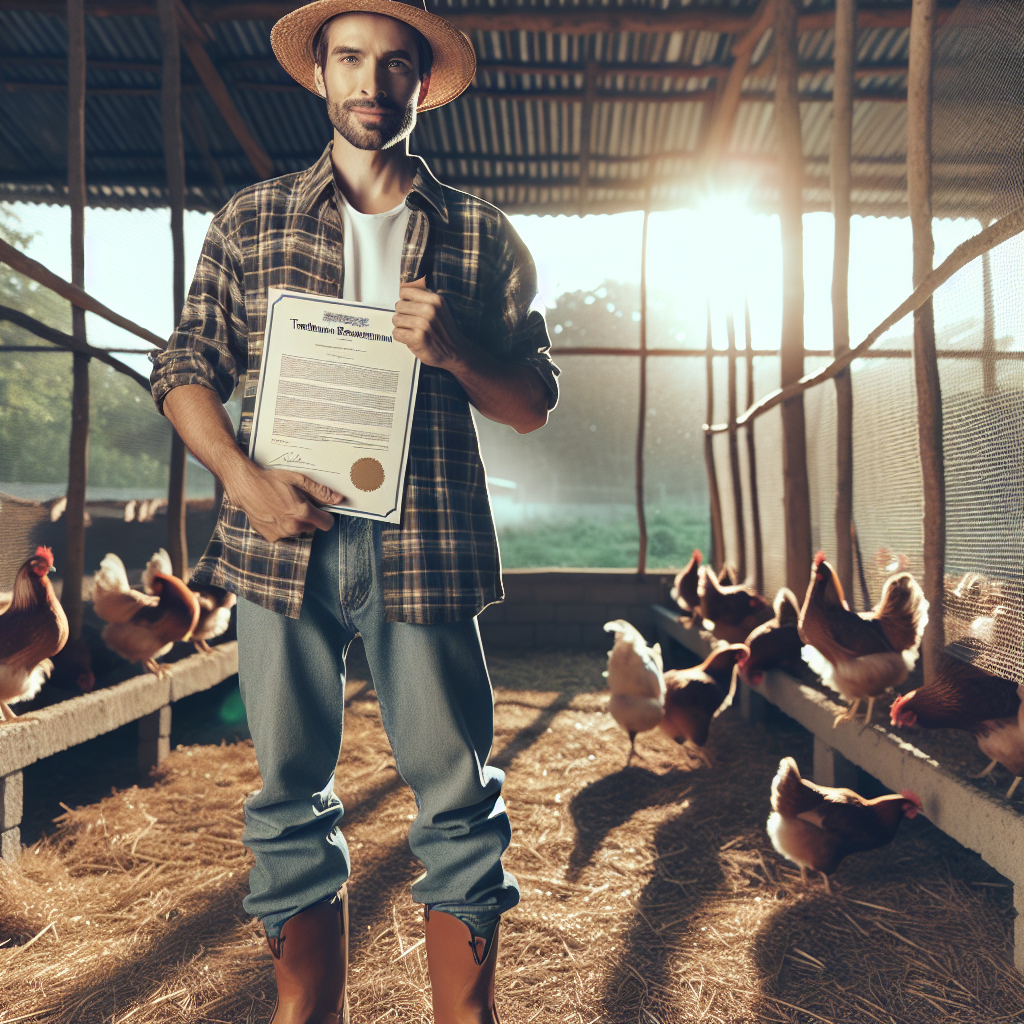Running a successful chicken business is no easy feat, and ensuring it remains free from legal disputes or challenges is crucial for its prosperity. In this article, you will discover effective strategies to safeguard your chicken business from any potential legal hurdles. From securing robust contracts and agreements to implementing thorough risk management protocols, you will gain invaluable insights that will help protect your business and ensure it thrives amidst a potentially litigious landscape. So, if you’re ready to take the necessary steps to protect your chicken business, read on!
Intellectual Property Protection
Registering trademarks and logos
To safeguard your chicken business from potential legal disputes or challenges, it is crucial to register your trademarks and logos. Registering these intellectual property rights provides you with legal protection and exclusive rights to use them. It prevents others from using similar marks or logos that may create confusion among consumers. By registering your trademarks and logos, you can establish your brand identity and secure your market position.
Protecting original recipes and formulas
Another important aspect of intellectual property protection is safeguarding your original recipes and formulas. These unique creations set your chicken products apart from competitors and contribute to your business’s success. To protect them, it is advisable to keep them as trade secrets. Implementing strict confidentiality measures, such as non-disclosure agreements with employees and business partners, can help maintain the secrecy of these invaluable assets.
Patenting innovative chicken farming technologies
Innovation in chicken farming technologies can give your business a competitive edge. To safeguard these inventions, consider patenting them. A patent grants exclusive rights to make, use, and sell your invention for a specified period. By patenting your innovative chicken farming technologies, you can prevent others from using them without your permission, ensuring that you reap the benefits of your ingenuity and hard work.
Compliance with Laws and Regulations
Understanding local, state, and federal regulations
Complying with laws and regulations is essential to safeguard your chicken business from legal disputes and challenges. Familiarize yourself with local, state, and federal laws that govern your industry. Understand the legal requirements related to zoning, permits, licenses, health and safety standards, and employment practices. Stay updated on any changes in regulations to ensure ongoing compliance and avoid potential penalties or legal conflicts.
Obtaining necessary licenses and permits
To operate your chicken business legally, you must obtain the necessary licenses and permits. This includes permits for chicken farming, food handling, and transportation, among others. Ensure that you thoroughly understand the application process and any specific requirements for obtaining these licenses and permits. By obtaining them, you demonstrate your commitment to operating within the bounds of the law and provide confidence to customers, suppliers, and regulatory authorities.
Complying with food safety and labeling requirements
When it comes to the food industry, following food safety standards and labeling requirements is crucial. Ensure that your chicken products meet all the necessary health and safety guidelines, such as proper storage, handling, and processing procedures. Additionally, accurately label your products with the required information, including ingredients, nutritional facts, allergen warnings, and expiration dates. Complying with these requirements not only protects your customers but also helps you avoid potential legal disputes related to product quality or safety.
Contract Management
Drafting clear and comprehensive contracts
Effective contract management is essential for protecting your chicken business from legal disputes. When entering into agreements with suppliers, distributors, or business partners, it is crucial to draft clear and comprehensive contracts. These contracts should outline the rights and obligations of all parties involved, including terms of payment, delivery schedules, quality standards, and dispute resolution mechanisms. Working with a lawyer experienced in contract law can help ensure that your contracts accurately reflect the intentions and protect the interests of your chicken business.
Including dispute resolution mechanisms
To mitigate potential legal disputes, it is advisable to include dispute resolution mechanisms in your contracts. These mechanisms provide a structured approach for resolving conflicts and can help you avoid costly litigation. Consider including clauses for mediation, arbitration, or alternative dispute resolution methods that allow parties to negotiate and find mutually agreeable solutions. By including these mechanisms, you demonstrate your commitment to resolving issues amicably and maintaining positive business relationships.
Ensuring proper documentation for all business agreements
Maintaining proper documentation for all your business agreements is crucial for safeguarding your chicken business. Ensure that you have copies of all contracts, amendments, and other relevant documents. Properly organize and store these documents so that they are easily accessible when needed. By maintaining thorough and well-documented records, you can protect yourself in case of any legal disputes or challenges, providing evidence of the agreed-upon terms and obligations.
Employment Practices
Complying with labor and employment laws
Adhering to labor and employment laws is vital for protecting your chicken business from legal challenges related to employee rights and workplace practices. Familiarize yourself with the laws governing wages, working hours, employee benefits, and workplace safety. Ensure that you consistently comply with these laws and regularly update your practices and policies to align with any changes in regulations. By treating your employees fairly and lawfully, you establish a positive work culture and reduce the risk of potential legal disputes.
Creating fair employment policies and practices
To safeguard your chicken business and maintain a harmonious work environment, it is essential to create fair employment policies and practices. Clearly define your expectations for employee behavior, performance standards, and benefits. Establish policies to address issues like discrimination, harassment, and equal opportunity. Communicate these policies effectively to all employees through an employee handbook or other means. By promoting fairness and transparency, you foster employee loyalty and reduce the likelihood of legal disputes arising from workplace issues.
Providing proper training on safety and hygiene
Safety and hygiene are paramount in any chicken business. Providing proper training to your employees on safety practices and hygiene protocols not only ensures compliance with legal requirements but also minimizes the risk of accidents, injuries, or foodborne illnesses. Train your employees on proper handling of chickens, equipment usage, sanitation procedures, and personal hygiene. Regularly reinforce these training programs to maintain a culture of safety and mitigate potential legal challenges arising from negligence or non-compliance.
Risk Management
Implementing comprehensive insurance coverage
Effective risk management involves implementing comprehensive insurance coverage for your chicken business. Insurance policies tailored to your specific needs can protect your business from various risks, such as property damage, product liability, or lawsuits. Work with an insurance professional knowledgeable in the food industry to assess your risks and select appropriate coverage options. Regularly review your insurance policies to ensure they adequately reflect your current operations and mitigate potential financial losses in case of unexpected events.
Regularly assessing and reducing potential risks
To proactively safeguard your chicken business, regularly assess and reduce potential risks. Conduct thorough risk assessments to identify areas of vulnerability in your operations. Implement appropriate risk mitigation strategies, such as implementing safety protocols, conducting regular equipment maintenance, or enhancing security measures. By consistently evaluating and addressing potential risks, you demonstrate your commitment to the well-being of your employees, customers, and business as a whole, minimizing the likelihood of legal disputes or challenges.
Maintaining proper record-keeping and documentation
Maintaining proper record-keeping and documentation is a fundamental aspect of risk management. Accurate and comprehensive records provide valuable evidence and documentation in the event of any legal disputes or challenges. Keep records of safety inspections, equipment maintenance, employee training, and any incidents or accidents that occur. Store these records in a secure and accessible manner to ensure their availability when needed. By maintaining good record-keeping practices, you establish accountability, demonstrate compliance with regulations, and protect your chicken business from potential legal disputes.




